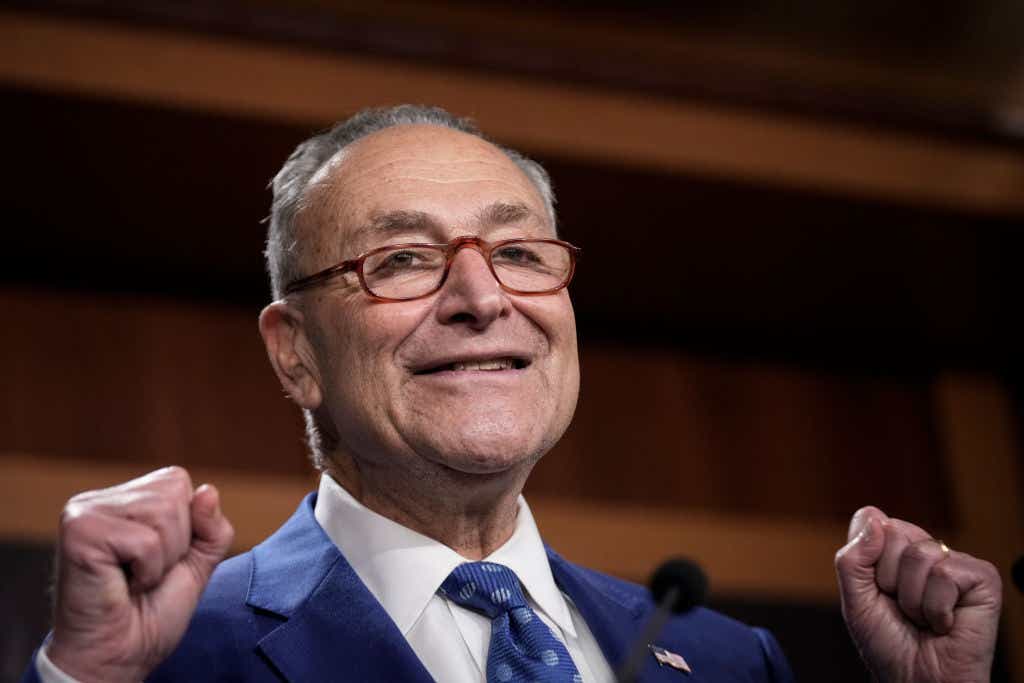The question of whether Democrats will be able to maintain their hold on Congress seems like the million-dollar one these days. But the recent passage of a new spending bill is making that possibility look more promising, ahead of the midterm elections.
Following a 27-hour marathon debate, Democratic senators passed the Inflation Reduction Act in a 51-50 vote, with Vice President Kamala Harris casting the tie-breaking ballot in the evenly divided Senate. Among other things, the $750 billion bill invests in clean energy, lowers certain health care costs, and ushers in new tax reforms on large corporations.
“To Americans who’ve lost faith that Congress can do big things, this bill is for you," Senate Majority Leader Chuck Schumer said. "This bill is going to change America for decades."
Even though the bill was passed without any Republican support, there were still some concessions: The legislation is a pared-down version of President Biden’s original $3.5 trillion proposal and lacks some of the Democrats’ more ambitious plans, such as free pre-kindergarten for all.
While the bill could still undergo some revisions as it moves through Congress, here's a peek into some major issues that made it into the bill.
Climate
The bill puts $370 billion toward energy and climate reform, which marks the largest federal investment in U.S. history aimed at combating global warming.
Even though it falls short of the $555 billion that Democrats had originally asked for, the investment would help cut U.S. carbon emissions by roughly 40 percent by 2030, according to independent analyses. Though this falls just short of Biden’s 50 percent reduction goal over the next decade, environmental experts say it will help get the U.S. back on track as a global leader when it comes to fighting climate change.
That’s not all: The climate portion also calls for $1.5 billion program payments for companies that cut emissions of methane and tax incentives for Americans to buy electric cars. On top of that, the climate portion includes credits for making homes more energy-efficient, and supporting the development of more carbon-capture technology.
"We're sitting on the precipice of what could be the most impactful climate legislation of our lifetimes," Mary Powell, CEO of the solar power company SunRun, told Yahoo Finance Live.
But, as part of Democrats' concessions to West Virginia Senator Joe Manchin, the bill does boost the production of fossil fuels by mandating that the federal government can auction off more public lands and waters for oil drilling.
Prescription drugs
The bill takes some major steps in helping make healthcare more affordable. For instance, for the first time ever, the federal health secretary would be able to directly negotiate certain drug prices for Medicare each year. This means Americans 65 and older wouldn’t have to pay more than $2,000 a year in out-of-pocket costs for certain life-saving (and costly) drugs, like ones used to treat cancer. But here's the kicker: that wouldn’t likely happen until 2026 and will only involve about a dozen drugs, before expanding further.
There's also a three-year extension on healthcare subsidies in the Affordable Care Act, which the government estimates kept premiums at $10 per month or lower when it was first implemented during the pandemic for the vast majority of those covered.
While the bill makes some great strides in helping Americans with healthcare costs, it does have some limits. Republicans blocked a provision under the reconciliation process that would have capped insulin prices at $35 a month for those covered under private health care plans.
Taxes
If you've made it this far, you're probably now wondering how Democrats plan to pay for all of these new investments. Democrats essentially hope to fund these bold initiatives by taxing billion-dollar companies that currently pay nothing to the U.S. government.
By tweaking federal laws, the bill creates a 15 percent minimum tax for large corporations making $1 billion or more in income, which is expected to generate an extra $300 billion in revenue. The bill also includes an extra $80 billion for the Internal Revenue Service to go after companies or individuals who cheat their taxes.
Still, there was some disagreement among the party’s ranks about closing a carried-interest loophole that allows some private equity and hedge fund managers to pay lower tax rates than many of their salaried employees. After Democratic Senator Kyrsten Sinema threatened to kill the bill over its inclusion, Democrats dropped it and instead included a 1% tax on stock buybacks. According to NBC News, this will effectively pull in more than the $14 billion that the initial provision would have made.
What’s next?
Now that the bill has passed the Senate, the House plans to take it up at the end of the week, and House Democrats hope to send it off President Biden’s desk to be signed into law. If successful, commentators say it would mark a huge legislative victory, and help Biden deliver on key promises he made during his campaign.
"The bill, when passed, will meet all of our goals — fighting climate change, lowering health care costs, closing tax loopholes abused by the wealthy, and reducing the deficit," Schumer said.









